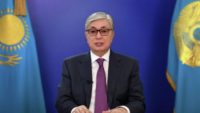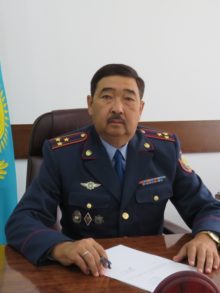With the purpose of deepening knowledge of the subjects studied, teaching cadets the skills of independent research work, developing analytical skills, promoting social and humanitarian and legal knowledge, developing urgent problems facing the interior affairs bodies, forming the scientific worldview of cadets, the scientific circle “Polyglot” Aktobe Law Institute of the Ministry of Internal Affairs of the Republic of Kazakhstan named after M. Bukenbaev April 13, 2017 was an evening of poetry (words of edification Abai Kunanbayev). Members of the scientific circle are 1st year cadets, 101-104 platoons.
His speech the head of the circle “Polyglot” senior lecturer of the Department of General Education, Lieutenant Colonel Sarsembaeva L.Zh. Began with the autobiography of Abai Kunanbayev, when and where he was born, who were the parents. She told about his education in the madrasah of Mullah Ahmet-Riza in Semipalatinsk, where they taught Arabic, Persian and other Oriental languages. About how he simultaneously attended the Russian school. About his self-education and the fact that only 40 years old Abai Kunanbayev creates his first adult poems. According to Soviet literary scholars, Abai ridiculed certain customs of the clan village, spoke out against the slave position of the woman, and, as repeated in his ceremonial Soviet biographies, “against social evil and ignorance.” Soviet literary sources, repeating this phrase, sometimes refer to its confirmation of the poem “Finally, the volost I became …” (1889), “Ruler to the authorities happy …” (1889) and “Culembai” (1888).
Abai Kunanbayev was an innovator of Kazakh poetry; Poems dedicated to the seasons are innovative: “Spring” (1890), “Summer” (1886), “Autumn” (1889), “Winter” (1888), poems about the appointment of poetry (to teach good and condemn the bad). Plots of poems “Masgood” (1887) and “The Tale of Azim” are based on motifs of Eastern classical literature. In the poem “Iskander” the mind in the person of Aristotle and the greed of the conqueror in the person of Alexander Makedonsky are contrasted.
He introduced new dimensions, rhymes and verse forms into the Kazakh versification: eight-text and six-text. Abai created about 170 poems and 56 translations, written poems, “Words of edification” (“Karasozder.”) Abai was also a composer. He created about two dozen tunes that are popular these days. Some of his verses Abai Kunanbaev transferred to music, and the song for his poems “Kozimnіn karasy” (“You are the pupil of my eyes”, translated by Maria Petrovy) became folk.
Further Sarsembayev L.Zh. stopped on the famous work of Abai, the prosaic poem “Karasoz” (in the literal translation “Simple (literally – black) word”), consisting of 45 short parables or philosophical treatises. These “edifications” raise the problems of history, pedagogy, morality and the rights of ethnic Kazakhs. “Karasoz” was created by Abay in the declining years. There are two of her translations into Russian and one attempt to retell in German, there are no other translations; Perhaps because of the limited artistic value of the prosaic “poem”, but perhaps also because “none of the translators could not cope with the poetic beauties and philosophical peaks” of this text (as stated in the official canon of Kazakh literary criticism). The Russian translation was published in 1945, on the occasion of the 100th anniversary of the birth of Abai, in the publishing house “Fiction”, and is a somewhat ironic text by Viktor Shklovsky called “edification.” Later this translation was published in 1954 and 1979. There are also translations of the Kazakh writer Satimzhan Sanbayev under the title “Words of edification” (the translation is a repetition of Shklovsky’s text with ironical intonations removed from it, 1970), and the writer Rolan Seisenbayev, with a changed title ( “The Book of Words,” an attempt to present the text of a “prosaic poem” in German, 1993). “Translation” of this poem into Chinese has little to do with the original and is a collection of scattered moralizing paragraphs, remotely overlapping with the themes of “edification.”
Cadets S. Sisenbay and A. Nurzhauova brought to the audience the essence and meaning of the words of edification of Abai Kunanbayev.
L.Sarsembaeva
Head of the circle :
Senior lecturer of the DGED
Lieutenant colonel of the police











